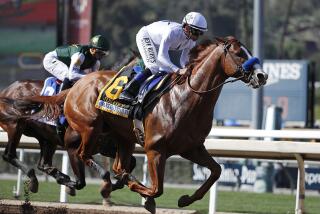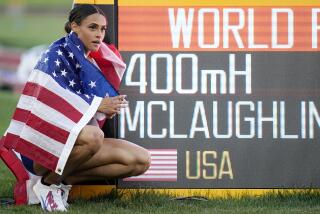Court Order Won’t Stop Olympic Ban : Track and field: Runners who compete against Reynolds in trials could be ineligible for Barcelona Games.
- Share via
If Butch Reynolds obtains a court order that allows him to run in the U.S. Olympic trials, athletes who compete against him risk their eligibility for the Summer Olympics, a high-ranking official with the International Amateur Athletic Federation said Tuesday.
“It means we may have an Olympic Games without American 400-meter runners,” the group’s secretary general, Istvan Gyulai of Hungary, told the Associated Press.
Reynolds, whose two-year suspension for failing a test for anabolic steroids in 1990 does not expire until three days after the Barcelona Olympics end on Aug. 9, has exhausted his appeals within the IAAF.
But a federal judge in Columbus, Ohio, has issued an order that enables Reynolds to compete in the United States, and, on June 18, the court will determine whether to extend that order through the U.S. Olympic track and field trials, which are scheduled to begin the next day at New Orleans.
Officials from The Athletics Congress, which governs track and field in the United States, said Tuesday that they will review the IAAF’s position and issue a statement within the next few days.
Mike Moran, spokesman for the U.S. Olympic Committee, said that the USOC’s constitution prohibits athletes who are ineligible internationally from competing in U.S. trials. He declined to speculate on the USOC’s response if ordered by a federal court to allow Reynolds to run at New Orleans.
“It will be the Olympic trials for lawyers,” Moran said.
Also on Tuesday, Delisa Floyd, a U.S. 800-meter runner, was denied by a federal judge in Denver in her quest for an injunction that would have enabled her to compete in the Olympic trials despite her suspension by the IAAF last summer for failing a test for a banned stimulant. She claimed that the USOC misinformed her about the legality of a medication that she was using.
Reynolds, the world record-holder and 1988 Olympic silver medalist in the 400 meters from Columbus, has been seeking to prove his innocence since being suspended after a meet on Aug. 12, 1990, at Monte Carlo. He won an appeal earlier this year with TAC, but that panel’s findings were rejected last month by the IAAF.
He fared better with the judicial system, winning a temporary restraining order that allowed him to compete in the United States a short time before he was scheduled to run in an international meet at San Jose. But when the IAAF threatened to suspend everyone who entered the meet, the promoter withdrew Reynolds’ invitation.
Reynolds, however, competed last weekend in a meet at San Francisco, winning the 400 meters in a time of 44.98 that was better than required to qualify for the Olympic trials.
Gyulai said Tuesday that all runners who ran against Reynolds at San Francisco have been suspended indefinitely and threatened similar action against those who compete against him in the future. He has committed to run tonight in a meet at Holmdel, N.J.
“The IAAF rule is very clear,” Gyulai said. “Any athlete who competes in any meeting or any event in which a non-eligible athlete competes, they also become ineligible.”
Antonio Pettigrew, the 400-meter winner in the 1991 World Championships, told Reuters that he agreed with the IAAF’s position on Reynolds. Pettigrew added: “I don’t see TAC letting him jeopardize everyone by running in the trials. I don’t want my Olympic dream ended that way.”
None of the runners who competed against Reynolds at San Francisco were considered among the favorites to earn berths on the U.S. Olympic team.
Gyulai also said that the IAAF will meet before the Summer Olympics to determine whether Reynolds’ suspension should be extended beyond Aug. 12 because his actions have damaged the sport.
Track and field officials in the United States did not take the IAAF’s threat to suspend every athlete in the San Jose meet particularly seriously because they believed the federation would ultimately succumb to pressure from the International Olympic Committee and NBC, which has the television rights to the Summer Olympics, to allow those athletes to compete at Barcelona.
But they are concerned that the IAAF could take action against the athletes in Reynolds’ event without creating a furor.
More to Read
Go beyond the scoreboard
Get the latest on L.A.'s teams in the daily Sports Report newsletter.
You may occasionally receive promotional content from the Los Angeles Times.






